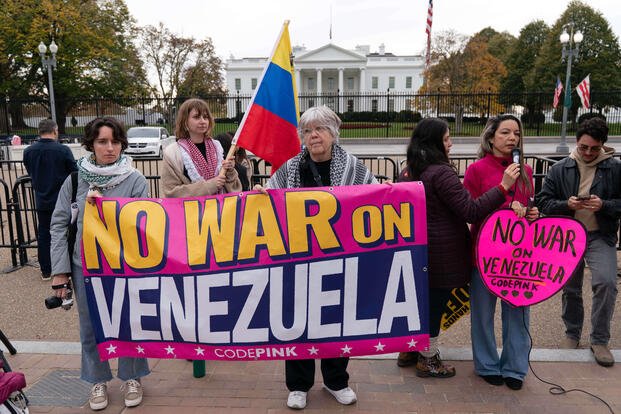A fight over who controls war powers is unfolding on Capitol Hill as House Democrats move to force a binding vote that could block President Donald Trump from launching or expanding military action in Venezuela without direct authorization from Congress.
The showdown is unfolding as the Trump administration carries out U.S. strikes it says are aimed at cartel and narcotics operations in the Caribbean, causing lawmakers to confront urgent questions about presidential authority, regional stability, and the risk of a wider conflict. Recent activity involving boat strikes and warship movements near Venezuela has raised questions about the administration’s long-term goals and highlighted how quickly the mission could evolve.
“While Democrats and the fake news have joined forces to push nonsense about President Trump’s authority as commander in chief, the president’s actions to halt the scourge of narco-terrorism are consistent with his responsibility to protect Americans and pursuant to his constitutional authority,” White House spokesperson Anna Kelly told Military.com. “All actions comply fully with the law of armed conflict.”
A senior administration official speaking on background said Congress has received briefings regarding the administration’s actions and legal justification. Lawmakers have expressed competing interpretations of the administration’s authority to act in the region.

'Transparency and Accountability'
A new War Powers Resolution introduced by Rep. Jim Himes (D-CT) is aimed at reasserting congressional authority over the use of force.
“We cannot allow any president to unilaterally drag the United States into a conflict,” Himes said in remarks provided to Military.com.
In the Senate, Democrat Andy Kim of New Jersey echoed that position.
“Decisions of war belong with Congress and the American people,” Kim told Military.com. “Transparency and accountability are non-negotiable when American lives and global stability are at stake.”
“Transparency and accountability are non-negotiable when American lives and global stability are at stake.”
Democrats argue the vote is necessary to protect the Constitution and prevent the United States from sliding into an undeclared conflict. Republicans counter that the president has broad authority to act against transnational criminal networks and armed groups that threaten American interests and allies.
Military.com contacted multiple U.S. House Republicans seeking comment on the matter.

The pending vote could force difficult decisions for members in swing districts and in states with major ports, military bases, and trade routes tied to the Caribbean basin.
Pentagon Pushes Back
The Pentagon insists the current mission is limited and legally justified.
“These presidentially directed strikes were conducted against the operations of a designated terrorist organization and were taken in defense of vital U.S. national interests and in the collective self-defense of other nations,” Pentagon spokesperson Kingsley Wilson told Military.com.
Wilson said the strikes took place in international waters and emphasized that no U.S. ground forces were deployed. He said precision targeting and strict rules of engagement were used to reduce risk to civilians and American personnel.

Alarm Spreads Across Region
Latin American governments and regional organizations are closely monitoring developments as Washington debates its next move.
The Organization of American States (OAS) urged restraint and stressed the importance of preventing escalation in a region long defined by fragile stability and competing political currents. OAS is the world’s oldest regional organization, operating by four main pillars: democracy, human rights, security and development.
“The Americas remain a zone of peace with no open wars,” an OAS spokesperson told Military.com. “Our shared responsibility is to preserve that peace through dialogue and cooperation.”

Any continued rise in tensions could disrupt energy exports, maritime shipping routes, and regional migration patterns—all of which flow through Caribbean corridors tied to U.S., Latin America and global trade networks.
House leadership is weighing whether to fast-track the War Powers Resolution for a vote. If it passes, the White House could face a direct challenge to its ability to continue or expand military operations without congressional backing.















